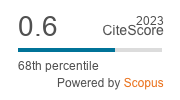About the Journal
The Journal of Contemporary History is a scholarly journal that publishes papers thematically related to contemporary history. It is published by the Croatian Institute of History. The first issue dates from 1969. The Journal is published three times per year and contains previously unpublished articles. The Journal of Contemporary History publishes articles in Croatian, focusing on topics relevant to contemporary Croatian history.
All articles are subject to quality control through initial editorial review, while scientific papers are subject to text-matching controls and a strict review process that includes at least two double-blind reviews by anonymous reviewers.
The Journal of Contemporary History is referenced in the following publications: Croatian Bibliography, Series B; Central and Eastern European Online Library (CEEOL); European Reference Index for the Humanities and the Social Sciences (ERIH PLUS); Historical Abstracts (EBSCOhost); International Bibliography of the Social Sciences (IBSS); Scopus; Ulrichsweb, Global Serials Directory; Web of Science Core Collection, Emerging Sources Citation Index (ESCI).
The Journal belongs to the A1 category of journals, which are considered of equal quality to journals with internationally-recognised reviews.
The Journal has an electronic and a printed form. It supports open access, meaning that the entire contents of its electronic edition are accessible freely, without a fee for the users or their institutions.
Sending Manuscripts
Our call for papers is always open, and manuscripts can be sent to the editorial board throughout the year, exclusively at the web address https://hrcak.srce.hr/ojs/index.php/casopis-za-suvremenu-povijest/index. In case of problems or concerns, authors can contact the editorial board via email (bostajmer@gmail.com; stipica.grgic@isp.hr; dgodic@isp.hr). The Journal does not bill the authors for the expenses of receiving, reviewing, or publishing their works.
The editorial board of the Journal of Contemporary History accepts all papers that have not previously been published elsewhere, except research results published in the form of summaries and previously exhibited at a scientific conference (which should be highlighted in a note).
The Journal of Contemporary History publishes articles in Croatian. Authors who wish to publish an article in a major world language are directed to the Review of Croatian History, which has the same publisher (rch@isp.hr). The Journal publishes scientific papers, and professional papers only in exceptional cases. Along with reviewed scientific papers, the Journal publishes other contributions of scholarly and professional interest, which are subject only to initial review: in memoriam, reactions, reviews, and overviews.
The text of the paper is submitted exclusively in digital form (any version of MS Word or an MS Word compatible program). Use of the Times New Roman CE font is mandatory in order to avoid problems with Croatian characters. The main body of the text should be font size 12, line spacing 1.5. Notes should be font size 10, line spacing 1.0. Notes are written on the bottom of the page (footnotes). The recommended length of a paper (including notes and bibliography) should not exceed 30 pages using the aforementioned font size and line spacing. The editorial board may, in exceptional cases, decide to print longer texts.
The paper should begin with an abstract (5–10 lines) and 5–7 key words separated by semicolons (;). The bibliography and sources should be listed after the main text. At the end of the paper, the author should write a longer summary (15–25 lines), which should contain all the elements important for understanding the topic and the author’s contribution. This summary is published in English (or another relevant major world language), but the author can also submit it in Croatian.
We kindly ask the authors of papers that are subject to the review process to remove from their text all information that could reveal their identity (name and surname, project information), and also to remove identity information from the properties of their electronic document. Upon submission, the paper is automatically linked to the author who submitted it; if there are multiple authors, all need to be linked to the paper during submission. Project data that authors wish to add to the paper can be stated in a comment to the editor during submission.
Any subsequent addition, deletion, or revision of author name(s) can be done before the manuscript is accepted only with the permission of the Journal’s editorial board. In order to request such a change, it is necessary to send the following to the editorial board: (a) the reason for changing the list of authors and (b) written confirmation (e-mail, letter) from all authors that they agree with the change. The number of authors must be in line with the paper’s scientific contribution.
Review Process
Accepted texts must be of a quality that meets the scientific and professional standards of the journal.
An editor may reject an article without external review if he or she believes the topic of the article lies beyond the focus of the journal, if the author does not respect ethical norms, if the article is of poor quality, or if it does not meet the conditions for sending articles to the journal. The editorial board secures two independent peer reviews for each scientific paper that passes editorial evaluation.
The editorial board of the Journal of Contemporary History strives to prevent any sort of violation of scientific research integrity. All submitted article manuscripts are checked using iThenticate Crossref Similarity Check.
The Journal of Contemporary History applies the double-blind review process typical of the humanities, in which the editor does not disclose the identity of the author or the reviewer. The editorial board strives to conduct the review process as quickly and efficiently as possible, but this is largely subject to the availability and responsibility of the reviewers and the quality of received manuscripts. Authors will be informed of the results of the review process, and are obliged to revise their paper according to any instructions, suggestions, demands, and remarks made by the reviewers and editors, and mark all such changes. The revised texts will be made available to the reviewers upon their request. Reviewers give their opinion about the quality of the manuscript and suggest a category for the paper, while the final decision regarding the category is made by the editor-in-chief and the editorial board. Categories for papers include: original scientific paper, preliminary communication, review paper, and professional paper. The category of the paper will be indicated upon publishing. Authors can request that specific persons do not review their paper, which the editor shall take into consideration and may accept provided that the request is substantiated.
Apart from reviewed works, the journal publishes book and periodical overviews, conference and exhibition reports, and reviews. Works of this type, except critical reviews and reactions, should not exceed 5 pages. Critical reviews and reactions can be longer, and may contain notes, a summary, and a bibliography.
No royalties are paid, but the authors of papers are provided with one free copy of the issue in which their paper is published.
Publishing Ethics
The Journal of Contemporary History advocates the promotion of the highest ethical publishing procedures and maintenance of the integrity of scientific work.
The authors are responsible for the originality and authorship of their manuscript and need to behave in line with the ethical principles and rules of scientific integrity for authors of the European Association of Science Editors (EASE).
In case of suspicion of unethical scientific procedure (plagiarism, self-plagiarism, data manipulation, redundant manuscripts, donated/unmerited authorship, etc.), the editorial board shall act in accord with the ethical guidelines of the international association Committee on Publication Ethics (COPE), in line with the recommendation of the Ministry of Science and Education.
The journal publishes previously unreviewed works. In sending their work, the authors confirm that it is their own and original work, for which they accept scientific and ethical responsibility (in regard to plagiarism, data forgery, excessive publications of the same scientific result, misuse of authorship, etc.). The authors guarantee that their work has not been previously published in some other publication and that it has not simultaneously been sent to other journals for review.



